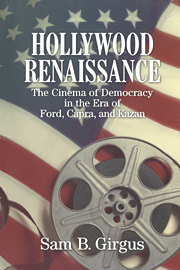Book contents
- Frontmatter
- Contents
- List of Illustrations
- Acknowledgments
- 1 Ethnics and Roughnecks: The Making of the Hollywood Renaissance
- 2 A Cinema for Democracy: John Ford and the Crisis of Modernity, Myth, and Meaning
- 3 Gender and American Character: Frank Capra
- 4 Revisioning Heroic Masculinity: From Ford to Hawks and Zinnemann
- 5 An American Conscience: Elia Kazan's Long Journey Home
- 6 Losing Tomorrow: George Stevens and the American Idea
- 7 Conclusion: Film and America after the Hollywood Renaissance
- Notes
- Filmography
- Index
4 - Revisioning Heroic Masculinity: From Ford to Hawks and Zinnemann
Published online by Cambridge University Press: 05 June 2012
- Frontmatter
- Contents
- List of Illustrations
- Acknowledgments
- 1 Ethnics and Roughnecks: The Making of the Hollywood Renaissance
- 2 A Cinema for Democracy: John Ford and the Crisis of Modernity, Myth, and Meaning
- 3 Gender and American Character: Frank Capra
- 4 Revisioning Heroic Masculinity: From Ford to Hawks and Zinnemann
- 5 An American Conscience: Elia Kazan's Long Journey Home
- 6 Losing Tomorrow: George Stevens and the American Idea
- 7 Conclusion: Film and America after the Hollywood Renaissance
- Notes
- Filmography
- Index
Summary
War Wounds: Sexual Politics and American Heroics
The stage from Tonto to Lordsburg repeats a great deal of history, but it also makes history. The story of John Ford's classic Stagecoach (1939) continues the mythical American journey of individual and communal regeneration. It takes a composite of various basic American character types and turns them into a transitory community capable of working and fighting together to achieve a common goal. The film's treatment of the Apaches as the stereotypical Indian enemy, Mexicans as comical or exotic others, and African Americans as markedly absent from American consciousness also says much about the popular self-conception of America during this period and how much both Ford and the country would change by the time of his last films, such as Cheyenne Autumn (1964), which so sympathetically advocates the cause of the Indians. Besides starting a hopeful transition toward a new future for some of the white people aboard the coach, the journey in Stagecoach resonates with another idea of the American myth as a flight from past oppressions, including in this instance the repressive moral conformity and emotional constraints of civilization as embodied in the faces and attitudes of the women who drive away the prostitute Dallas (Claire Trevor) and the alcoholic “Doc” Boone (Thomas Mitchell). The women in this scene project a form of late-1930s political correctness of such venomous harshness as to suggest Ford's own latent hostility toward women as authority figures.
- Type
- Chapter
- Information
- Hollywood RenaissanceThe Cinema of Democracy in the Era of Ford, Kapra, and Kazan, pp. 108 - 154Publisher: Cambridge University PressPrint publication year: 1998



